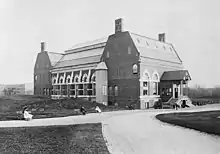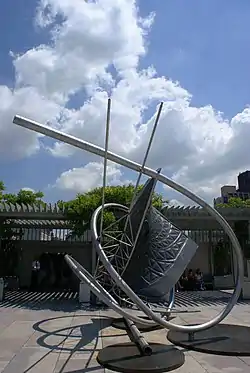_-_Central_Park%252C_NYC.jpg.webp) Entrance facade | |
| Location | 1000 Fifth Avenue, Manhattan, New York City |
|---|---|
| Coordinates | 40°46′46″N 73°57′47″W / 40.7794°N 73.9631°W |
| Director | Max Hollein |
| Public transit access | Subway: Bus: M1, M2, M3, M4, M79, M86 SBS |
| Website | Official website |
The Metropolitan Museum of Art | |
| Built | 1880 |
| Architect | Richard Morris Hunt; also Calvert Vaux; Jacob Wrey Mould |
| Architectural style | Beaux-Arts |
| NRHP reference No. | 86003556 |
| NYSRHP No. | 06101.000338 |
| NYCL No. | 0410, 0972 |
| Significant dates | |
| Added to NRHP | January 29, 1972[1] |
| Designated NHL | June 24, 1986[2] |
| Designated NYSRHP | June 23, 1980[3] |
| Designated NYCL | June 9, 1967 (exterior)[4] November 19, 1977 (interior)[5] |
The Met Fifth Avenue is the primary museum building for the Metropolitan Museum of Art in New York City. The building is located at 1000 Fifth Avenue, along the Museum Mile on the eastern edge of Central Park in Manhattan's Upper East Side.
History

_(18409519626).jpg.webp)
After negotiations with the City of New York in 1871, the Met was granted the land between the East Park Drive, Fifth Avenue, and the 79th and 85th Street transverse roads in Central Park. A red-brick and stone building was designed by American architect Calvert Vaux and his collaborator Jacob Wrey Mould. Vaux's ambitious building was not well received; the building was dubbed by critics as a "mausoleum", its High Victorian Gothic style was already considered dated prior to completion, and the president of the Met termed the project "a mistake".[6]
Within 20 years, a new architectural plan engulfing the Vaux building was already being executed. Since that time, many additions have been made, including the distinctive Beaux-Arts Fifth Avenue facade, Great Hall, and Grand Stairway. These were designed by architect and Met trustee Richard Morris Hunt, but completed by his son, Richard Howland Hunt in 1902 after his father's death.[7] The architectural sculpture on the facade is by Karl Bitter.[8]
The wings that completed the Fifth Avenue facade in the 1910s were designed by the firm of McKim, Mead & White. The modernistic glass sides and rear of the museum are the work of Roche-Dinkeloo. Kevin Roche was the architect for the master plan and expansion of the museum for over 40 years. He was responsible for designing all of its new wings and renovations including but not limited to the American Wing, Greek and Roman Court, and recently opened Islamic Wing.[9]
Architecture
.jpg.webp)
.jpg.webp)
The Met measures almost 1⁄4-mile (400 m) long and with more than 2 million square feet (190,000 m2) of floor space, more than 20 times the size of the original 1880 building.[10][11] The museum building is an accretion of over 20 structures, most of which are not visible from the exterior. The City of New York owns the museum building and contributes utilities, heat, and some of the cost of guardianship.
Interior
The building houses numerous galleries, including the Anna Wintour Costume Center and Astor Court, along with other spaces, including the Thomas J. Watson Library and the Robert Goldwater Library.
The Charles Engelhard Court of the American Wing features the facade of the Branch Bank of the United States, a Wall Street bank that was facing demolition in 1913.[12][13]
Roof garden

The Iris and B. Gerald Cantor Roof Garden is located on the roof near the southwestern corner of the museum. The garden's café and bar is a popular museum spot during the mild-weathered months, especially on Friday and Saturday evenings when large crowds can lead to long lines at the elevators. The roof garden offers views of Central Park and the Manhattan skyline.[14][15] The garden is the gift of philanthropists Iris and B. Gerald Cantor, founder and chairman of securities firm Cantor Fitzgerald.[16] The garden was opened to the public on August 1, 1987.[17]
Every summer since 1998 the roof garden has hosted a single-artist exhibition.[15] The artists have been: Ellsworth Kelly (1998), Magdalena Abakanowicz (1999), David Smith (2000), Joel Shapiro (2001), Claes Oldenburg and Coosje van Bruggen (2002), Roy Lichtenstein (2003), Andy Goldsworthy (2004), Sol LeWitt (2005), Cai Guo-Qiang (2006),[18] Frank Stella (2007), Jeff Koons (2008), Roxy Paine (2009), Big Bambú by Doug and Mike Starn (2010),[19] We Come in Peace by Huma Bhabha (2018),[20] and Parapivot by Alicja Kwade.[21]
The roof garden has views of the Manhattan skyline from a vantage point high above Central Park.[22] The views have been described as "the best in Manhattan."[23] Art critics have been known to complain that the view "distracts" from the art on exhibition.[24] New York Times art critic Ken Johnson complains that the "breathtaking, panoramic views of Central Park and the Manhattan skyline" creates "an inhospitable site for sculpture" that "discourages careful, contemplative looking."[25] Writer Mindy Aloff describes the roof garden as "the loveliest airborne space I know of in New York."[26] The café and bar in this garden are considered romantic by many.[22][27][28]
Landmark designations
The museum's main building was designated a city landmark by the New York City Landmarks Preservation Commission in 1967,[4] and its interior was separately recognized by the Landmarks Preservation Commission in 1977.[5] The Met's main building was designated a National Historic Landmark in 1986, recognizing both its monumental architecture, and its importance as a cultural institution.[29]
See also
Further reading
- Bayer, Andrea; Corey, Laura D., eds. (2020). Making the Met, 1870-2020. Metropolitan Museum of Art. ISBN 9781588397096.
- Howe, Winifred E. (1913). A History of The Metropolitan Museum of Art. Metropolitan Museum of Art.
References
- ↑ "National Register Information System". National Register of Historic Places. National Park Service. January 23, 2007.
- ↑ "Metropolitan Museum of Art". National Historic Landmark summary listing. National Park Service. Archived from the original on October 9, 2012. Retrieved February 18, 2013.
- ↑ "Cultural Resource Information System (CRIS)". New York State Office of Parks, Recreation and Historic Preservation. November 7, 2014. Retrieved July 20, 2023.
- 1 2 "Metropolitan Museum of Art" (PDF). New York City Landmarks Preservation Commission. June 9, 1967. Retrieved July 28, 2019.
- 1 2 "Metropolitan Museum of Art" (PDF). New York City Landmarks Preservation Commission. November 19, 1977. Retrieved July 28, 2019.
- ↑ Halford, Macy (December 1, 2008). "At the Museums: Four Eyes". The New Yorker. Archived from the original on December 18, 2008.
- ↑ Gross, Michael, Rogues' Gallery, The Secret History of the Moguls and the Money That Made the Metropolitan Museum, Broadway Books, New York, 2009, p. 75.
- ↑ Schevill, Ferdinand, 'Karl Bitter: A Biography", The University of Chicago Press, Chicago, Illinois, 1917 p. ix
- ↑ The Metropolitan Museum of Art Bulletin (Summer 1995)
- ↑ Ethridge, Alexandria (December 28, 2016). "How Did You Build This Museum? And More #MetKids Questions!". The Met. Retrieved January 7, 2022.
- ↑ "The Metropolitan Museum of Art at HumanitiesWeb". Humanitiesweb.org. January 13, 2012. Archived from the original on June 1, 2012. Retrieved June 11, 2012.
- ↑ Vogel, Carol (May 4, 2009). "The Met Offers a New Look at Americana". The New York Times. Archived from the original on November 26, 2016. Retrieved November 25, 2016.
- ↑ Heckscher, Morrison H. (Summer 1995). "The Metropolitan Museum of Art: An Architectural History" (PDF). The Metropolitan Museum of Art. p. 54. Archived (PDF) from the original on February 2, 2017. Retrieved November 25, 2016.
- ↑ Nash, Eric Peter (1996). New York's 50 Best Secret Architectural Treasures. New York: City & Co. ISBN 978-1-885492-31-9.
- 1 2 Baron, James; Quindlen, Anna (2009). The New York Times Book of New York: 549 Stories of the People, the Events, and the Life of the City – Past and Present. London: Black Dog Publishing. ISBN 978-1-57912-801-2.
- ↑ "Biography of B. Gerald Cantor". www.cantorfoundation.org. Archived from the original on June 21, 2011. Retrieved June 30, 2010.
- ↑ "New Roof Garden at Metropolitan Museum". The New York Times. June 4, 1987. Archived from the original on January 11, 2015. Retrieved June 30, 2010.
- ↑ Tinterow, Gary; Ross, David A. (2006). Cai Guo-Qiang: Transparent monument. Milan: Charta. ISBN 88-8158-617-7.
- ↑ "Doug and Mike Starn Create Monumental Sculpture for Metropolitan Museum's 2010 Roof Garden Installation; Big Bambú to Open April 27 April 27 – October 31, 2010 (weather permitting)" (Press release). The Metropolitan Museum of Art. April 27, 2010. Archived from the original on July 3, 2010. Retrieved June 30, 2010.
- ↑ "Otherworldly Figures Have Landed on The Met's Rooftop Garden". Untapped Cities. April 18, 2018. Retrieved June 20, 2019.
- ↑ Klimoski, Alex (April 18, 2019). "The Met's Annual Rooftop Commission Opens for the Spring 2019 Season". www.architecturalrecord.com. Retrieved June 21, 2019.
- 1 2 Louie, Elaine (July 17, 1996). "A Sip and a View, Without the Grit". The New York Times. Archived from the original on January 11, 2015. Retrieved June 30, 2010.
- ↑ Miller, Lori (August 2, 1987). "Met's Garden: Where Views Enhance Art". The New York Times. Archived from the original on January 11, 2015. Retrieved June 30, 2010.
- ↑ "Museum and Gallery Listings". The New York Times. May 16, 2008. Archived from the original on September 4, 2015. Retrieved June 30, 2010.
- ↑ Johnson, Ken (April 22, 2008). "Art Review, A Panoramic Backdrop for Meaning and Mischief". The New York Times. Archived from the original on September 25, 2011. Retrieved June 30, 2010.
- ↑ Aloff, Mindy (August 22, 1997). "Where to Cool Both Soul and Heels". The New York Times. Archived from the original on January 11, 2015. Retrieved June 30, 2010.
- ↑ Bykofsky, Sheree; Schwart, Arthur (2001). The 52 Most Romantic Dates in and Around New York City. Avon, MA: Adams Media. p. 63. ISBN 978-1-58062-462-6.
- ↑ Bennett, Bruce. "Nightlife: The Iris and B. Gerald Cantor Roof Garden". New York. Archived from the original on September 16, 2010. Retrieved June 30, 2010.
- ↑ "NHL nomination for Metropolitan Museum of Art". National Park Service. Retrieved December 29, 2017.
External links
| External videos | |
|---|---|
 Media related to Metropolitan Museum of Art - Main Building at Wikimedia Commons
Media related to Metropolitan Museum of Art - Main Building at Wikimedia Commons- Official website
- Interactive map of the building

